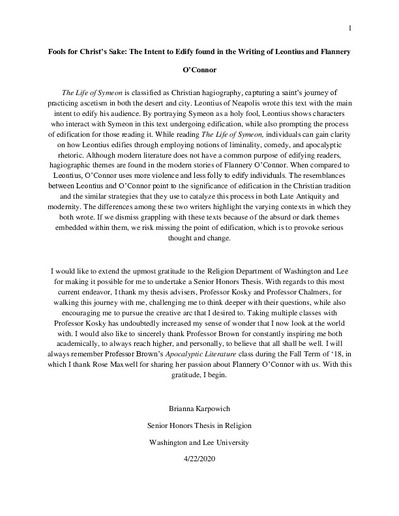| dc.rights.license | In Copyright | en_US |
| dc.creator | Karpowich, Brianna Anita | |
| dc.date.accessioned | 2020-05-24T17:58:14Z | |
| dc.date.available | 2020-05-24T17:58:14Z | |
| dc.date.created | 2020 | |
| dc.identifier | WLURG38_Karpowich_REL_2020 | |
| dc.identifier.uri | http://hdl.handle.net/11021/34760 | |
| dc.description | Thesis; [FULL-TEXT FREELY AVAILABLE ONLINE] | en_US |
| dc.description | Brianna Anita Karpowich is a member of the Class of 2020 of Washington and Lee University. | en_US |
| dc.description.abstract | The Life of Symeon is classified as Christian hagiography, capturing a saint's journey of practicing ascetism in both the desert and city. Leontius of Neapolis wrote this text with the main intent to edify his audience. By portraying Symeon as a holy fool, Leontius shows characters who interact with Symeon in this text undergoing edification, while also prompting the process of edification for those reading it. While reading The Life of Symeon, individuals can gain clarity on how Leontius edifies through employing notions of liminality, comedy, and apocalyptic rhetoric. Although modern literature does not have a common purpose of edifying readers, hagiographic themes are found in the modern stories of Flannery O'Connor. When compared to Leontius, O'Connor uses more violence and less folly to edify individuals. The resemblances between Leontius and O'Connor point to the significance of edification in the Christian tradition and the similar strategies that they use to catalyze this process in both Late Antiquity and modernity. The differences among these two writers highlight the varying contexts in which they both wrote. If we dismiss grappling with these texts because of the absurd or dark themes embedded within them, we risk missing the point of edification, which is to provoke serious thought and change. | en_US |
| dc.description.statementofresponsibility | Brianna Karpowich | |
| dc.format.extent | 62 pages | en_US |
| dc.language.iso | en_US | en_US |
| dc.rights | This material is made available for use in research, teaching, and private study, pursuant to U.S. Copyright law. The user assumes full responsibility for any use of the materials, including but not limited to, infringement of copyright and publication rights of reproduced materials. Any materials used should be fully credited with the source. | en_US |
| dc.rights.uri | http://rightsstatements.org/vocab/InC/1.0/ | en_US |
| dc.subject.other | Washington and Lee University -- Honors in Religion | en_US |
| dc.title | Fools for Christ's Sake: The Intent to Edify found in the Writing of Leontius and Flannery O'Connor (thesis) | en_US |
| dc.type | Text | en_US |
| dcterms.isPartOf | RG38 - Student Papers | |
| dc.rights.holder | Karpowich, Brianna Anita | |
| dc.subject.fast | Vita S. Symeonis Sali (Leontius, Bishop of Neapolis) | en_US |
| dc.subject.fast | O'Connor, Flannery | en_US |
| dc.subject.fast | Christian hagiography in literature | en_US |
| dc.subject.fast | Moral development in literature | en_US |
| dc.subject.fast | Religious education | en_US |
| local.department | Religion | en_US |
| local.scholarshiptype | Honors Thesis | en_US |
